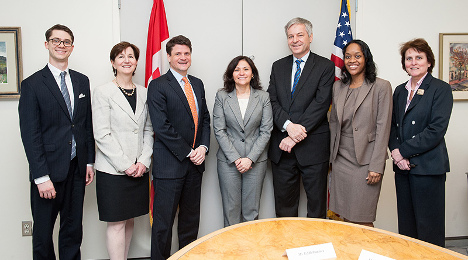FTC & CRTC strengthen cooperation on spam enforcement

FTC and Canadian officials at the signing of the memorandum of understanding. Photo by Keegan Bursaw of the Embassy of Canada)
By subscribing, you agree to receive communications from Auto Remarketing and our partners in accordance with our Privacy Policy. We may share your information with select partners and sponsors who may contact you about their products and services. You may unsubscribe at any time.
WASHINGTON, D.C. –
The Federal Trade Commission recently signed a memorandum of understanding with the Canadian Radio-television and Telecommunications Commission (CRTC) in a move officials described as a way to strengthen cross-border cooperation regarding Do Not Call and anti-spam enforcement matters.
The memorandum was signed by FTC chairwoman Edith Ramirez and Jean-Pierre Blais, the chairman of the CRTC.
The CRTC enforces the Canadian Anti-Spam Law, which became effective in 2014. Among other things, the law prohibits the sending of unsolicited commercial email and enables Canadian authorities to provide investigative assistance to foreign enforcement agencies, including the FTC.
Officials recapped that the memorandum recognizes the long-standing partnership between the two agencies, which includes many joint Do Not Call enforcement activities. It encourages U.S. and Canadian authorities to continue and expand information exchanges, and provide assistance for cross-border Do Not Call and anti-spam enforcement purposes.
The agencies also mentioned the memorandum encourages staff exchanges and policy-related initiatives, such as the Robocall Challenges that have led to crowd-sourced technological solutions to these calls. Under the memorandum, U.S. and Canadian authorities must maintain the confidentiality of information that has been shared.
The FTC vote authorizing Ramirez to sign the memorandum on behalf of the agency was 4-0.
Subscribe to Auto Remarketing to stay informed and stay ahead.
By subscribing, you agree to receive communications from Auto Remarketing and our partners in accordance with our Privacy Policy. We may share your information with select partners and sponsors who may contact you about their products and services. You may unsubscribe at any time.
“As we see more cross-border fraud, we must often rely on our enforcement partners around the world to help protect U.S. consumers. This agreement will enhance cooperation with the CRTC as we work together to combat illegal telemarketing and spam,” Ramirez said.


